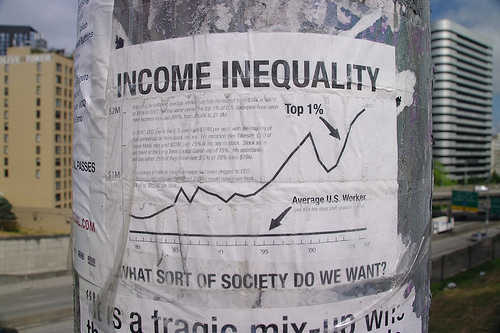
“It is as if the government had developed the economic policy equivalent of smart bombs, except these bombs carry payloads of cash for their carefully selected recipients,” Jacob S. Hacker and Paul Pierson write in Winner-Take-All Politics: How Washington Made the Rich Richer — And Turned Its Back on the Middle Class.
Those carefully selected recipients are the richest 1 percent of our richest 1 percent.
These richest 16,000 families with an average net worth of $371 million now own as much wealth as the bottom 90 percent combined, who earn less today — when adjusted for inflation — than they did in 1987.
Wealth has been sucked up by the richest of the richest since 1979, which is mysteriously right around the time that tax rates on the richest .01 percent where cut from the the mid-50 percent range down to where they are today below 40 percent. The 80s was also the end of America taxing the richest of the richest at a higher rate than the merely rich.
The result is America’s inequality now resembles the developing world and our inequality is worse than any advanced country.
Economist Thomas Piketty has pointed out that capital investments — the money you earn playing with money — are growing faster than the regular economy and this could lead dynastic wealth continuing to warp and distort our economy and politics. Even Republicans agree the inequality and the wealth gap is a problem. Jeb Bush’s Super PAC is called “Right to Rise” to try to sway this serious and broad conversation about inequality to a much smaller one about economic mobility.
So how are Republicans in Congress dealing with this problem? With a budget that radically shifts more wealth to the richest with “massive cuts in Medicaid, education, nutrition and health care.” Meanwhile it cuts the estate tax — which only affects those who leave their family more than $5 million, none of whom are farmers — to zero.
Much has been said about the hypocrisy of a party that constantly attacks the poor as takers then rewards winners of the genetic lottery for taking. But the hypocrisy isn’t the problem — it’s the policy.
Republicans want to take a crisis and make it worse.
This isn’t unique to our economy. When it comes to foreign policy, carbon pollution and health care, Republicans continue to propose policies that would exacerbate crises that threaten our stability and portend consequences that will require us to face reality at a much later date, when it will be too late.
We should be sending more American soldiers into the crises in the Middle East, even though sending American soldiers into the Middle East helped spark those crises.
We’re doing too much to fight carbon pollution, which is bad because that could make mullahs and billionaires a little less rich.
We’re getting too many people health insurance, which is bad because that makes Americans dependent on the government, even though every American who gets health insurance through an employer gets a government subsidy (and it would cost us less just to cover everyone with single payer).
Leading conservative “thinkers” are pushing for the sabotage of Medicare and Obamacare, even though we are now in a period when health spending is at a 50-year low and the private system the right wants us to embrace has given us the most expensive health care system in the advanced world, almost by a factor of two.
Paul Krugman points out that Republicans have a problem accepting reality. “Although they would never admit it, events have proved their most cherished beliefs wrong,” he writes.
Under President Obama, twice as many Americans have gained health insurance as lost it under George W. Bush. More jobs have been created than under two presidents named Bush combined, in half the time. And we’ve experienced the first year of economic growth in 40 years when carbon emissions didn’t increase.
For Republicans to acknowledge Obama’s many successes would be impossible. Because then they would have to accept that their solutions don’t fix our problems. They are our problem.
[Image my mSeattle | Flickr]



